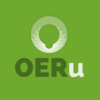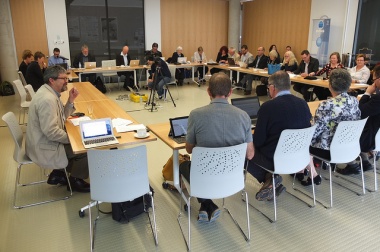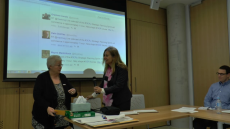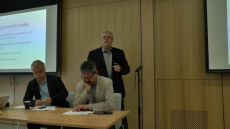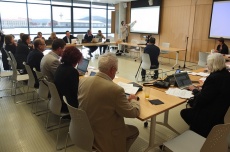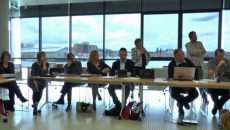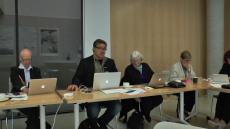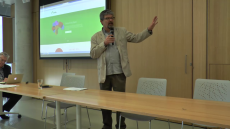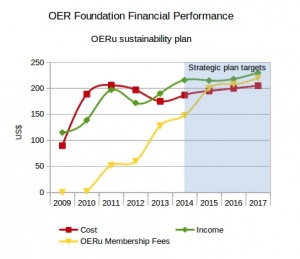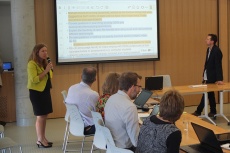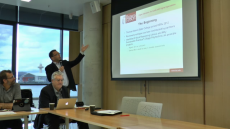OERu 14.11 report
| OERu 2014 Events | |
|---|---|
| OERu 14.11 Meeting of anchor partners | Homepage | Logistics | Agenda | Virtual participants | Face-to-face participants | Report |
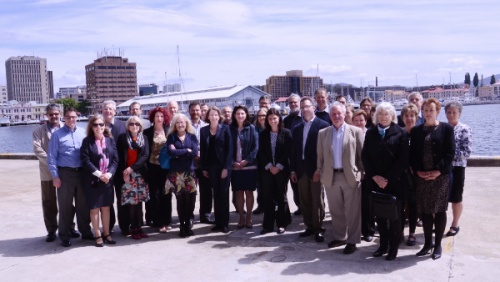
| “ | Chaos erupts at #oeru meeting during room reconfiguration necessitated by large number of participants. (Photo link) | ” |
| —@IrwinDev | ||
The third meeting of OERu anchor partners was hosted by the University of Tasmania on 6 and 7 November 2014 in Hobart, Australia.
Participants reflected on progress of the OERu's 2014 operational priorities and reviewed the OERu Strategic Plan 2015-2017 for tabling at the second meeting of the OERu Council of Chief Executive Officers. During the meeting, attendees developed proposals for action for the implementation the consolidation phase of the OERu initiative.
Key documents
Contents
- 1 Summary of outputs and key decisions
- 2 Session 1: Aims of the meeting, meeting our partners and our OERu journey
- 3 Session 2: Taking stock, critical friend review and meeting priorities
- 4 Session 3: Strategic Goal 1: Achieve a fiscally sustainable and scalable OERu network
- 5 Session 4: Show and tell
- 6 Session 5: Developing a coherent OERu programme of study
- 7 Session 6: Improving processes for OERu operating at scale
- 8 Session 7: Innovation pilots
- 9 Session 8: Input evaluation
- 10 Session 9: Conclusion and the way forward
- 11 References
Summary of outputs and key decisions
| “ | The #OERu is "distinctively open"- a première model of open governance, open operation & commitment to openness. | ” |
The summary of key decisions should be read in conjunction with the meeting report and corresponding links to the action items below.
Generic decisions
- OERu Strategic Plan 2015 - 2017 endorsed by the Partner's meeting to be tabled at the meeting of the OERu Council of Chief Executive Officers
- Implement Institutional Action Plans as a requirement of OERu membership where each partner indicates how they plan to allocate their agreed 0.2FTE contribution to the network linked to the annual KPIs and operational priorities of the OERu strategic plan. It is also recommended that the Institutional Action Plans should include:
- Target dates for completion of nominated courses
- Encourage the constitution of teams including learning designers, library staff and participating academics.
- Extend OERu roles beyond primary contact person at each institution, for example technical contact, library contact etc.
2015 OERu organisational structure
- Maintain the working group organisational structure and expand participation from representatives of OERu partner institutions. The following adaptations will be implemented during 2015:
- Reconstitute the Credit Transfer and Course Articulation group as the Standing Committee for Credit Transfer to progress the implementation of the initial draft of the OERu credit transfer and course articulation guidelines.
- Establish an OERu Partner Engagement working group to provide oversight for the proposed annual Institutional Action Plans and related partner engagement activities.
- Establish a sub group to focus on the 1st year General Education Component to work in conjunction with the Curriculum and Programme of Study working group.
- The coordination of the OERu partner recruitment activities will be subsumed by the Strategic Planning working group prioritising recruitment from North America, Europe and Africa with targeted recruitment efforts through regional university associations.
Technology
- Implement prototype courses to explore the use of complementary delivery platforms including WordPress and Open edX for OERu courses.
- Progress the implementation of the OERu community source concept:
- Survey OERu partner institutions to assess the open source software development skills within the network.
- Develop and publish a rationale why participation in the community source initiative is beneficial for partner institutions and prepare guidelines on how to make the institutional case for participation.
- Progress solutions for identity and access management of OERu learners for the future (eg analytics, federated partner services).
- Develop and build technical solutions to illustrate and communicate prospective pathways of study leading to credentials for the main OERu website.
Partner engagement
- Establish a mentoring network for new partners and supporting resources to be accessed from the oeru.org website and convene monthly webinars under the Partner Engagement working group.
- Offer professional development opportunities in OER and OEP, for example course development sprints.
- Reconfigure the OERu Partners' Design and Development Manual to be published on the main OERu.org site taking different target audiences into account including new OERu partners, students and the open community and request input from marketing departments at OERu partner institutions.
Future learner engagement
- Improve communication relating to OERu study options, services and pricing, including the development of student testimonial videos and requesting input from OERu marketing departments for public course descriptions on the OERu site.
- Develop an OERu taster course for learners to gain experience in studying at the OERu including videos and other support resources to assist learners in navigating OERu courses.
Programme of study and product development
- Leverage the OERu point of difference as an international collaboration and assemble courses in the curriculum areas of inter-cultural studies, internationalisation, social justice and equity.
- Develop an idealised programme of study document for guiding product development for the OERu Bachelor of General Studies (BGS) and corresponding pathways of study based on a mapping exercise of the programme approval documents from OERu partners who offer the BGS (or equivalent credential) against the Transnational Qualifications Framework (see detailed recommendations below).
- Develop a general education 1st year of study incorporating foundation skill courses and discipline specific courses in the knowledge domains of the Humanities, Sciences, Business and Information Technology with corresponding exit credentials, for example, Certificate in University or Tertiary Studies and Diploma of General Studies (see detailed recommendations below).
- Explore the development of a generic micro course for Digital Citizenship at 1st year level.
2015 innovation pilot projects
- Progress the design and development of a OERu course on developing a PLAR portfolio by reconfiguring the TESC course contributions for international implementation guided by the key questions raised during this OERu partners meeting (see detailed recommendations below).
- Develop an OERu mOOC on indigenous studies for parallel mode delivery by two or more partners (see detailed recommendations below).
- Progress the implementation of an OERu MOOC for the intended target audience in developing countries by partnering with, for instance, the Commonwealth of Learning, which has experience in MOOC delivery in the developing world and explore using the Open edX platform (see detailed recommendations below).
- Consider the integration of delivery alternatives which foster "doing" rather than mere information transmission by incorporating the Domain of One's Own approach for OERu learners and developing a toolbox of technical tools which course designers could integrate into the OERu PLE delivery model (see detailed recommendations below).
- Develop and implement an OERu induction mOOC for new partners and staff (see detailed recommendations below).
Session 1: Aims of the meeting, meeting our partners and our OERu journey
| Video recording of Session 1 | ||||||||||||||||||||||||
|---|---|---|---|---|---|---|---|---|---|---|---|---|---|---|---|---|---|---|---|---|---|---|---|---|
|
| “ | The introduction from all the participants was a fascinating mix of insight, vision, and expertise. What a great group at the #OERu meeting | ” |
Dr David Porter, representing the Board of Directors of the OER Foundation, acknowledged the support and thought leadership from members of the Board and the financial contributions from the William and Flora Hewlett Foundation and the Commonwealth of Learning towards the implementation of the OERu. He summarised the aims of the meeting (see Slideshare) as follows:
- to review progress on the 2014 operational priorities;
- to review the OERu Strategic Plan 2015-2017 and calibrate key performance indicators for 2015;
- to develop proposals for action for the implementation of the OERu's consolidation phase; and
- to identify issues for tabling at the meeting of the OERu Council of Chief Executive Officers.
Participants were invited to introduce themselves (review the video recording).
Dr Wayne Mackintosh, Director of the OER Foundation, summarised the implementation of the OERu distinguishing three phases (see Slideshare):
- Prototyping phase (2012 – 2013): At the 1st Meeting of Founding OERu Anchor Partners hosted at Otago Polytechnic in November 2011, the network agreed to develop three prototype courses to inform planning and decision-making in preparation for the launch meeting at Thompson Rivers University in October and November 2013.
- Consolidation phase (2014 – 2016): Developing the OERu Programme of Study where the network will focus on assembling courses for a coherent programme of study leading to a Bachelor of General Studies.
- Scalable implementation phase (2017 – ): Achieving a fiscally self-sustaining network without reliance on 3rd party donor funding and expanding the OERu programme of study to support mainstream integration of open education approaches at partner institutions.
Session 2: Taking stock, critical friend review and meeting priorities
| Video recording of Session 2 | |||||||||||||||||||||||||||||||||
|---|---|---|---|---|---|---|---|---|---|---|---|---|---|---|---|---|---|---|---|---|---|---|---|---|---|---|---|---|---|---|---|---|---|
|
| “ | Many reasons for adopting and using Open Educational Resources described by the #OERu partners here: access, affordability, improved design. | ” |
2014 report of the OERu Management Committee and working groups
The OERu Management Committee provides managerial and operational oversight of the OERu and comprises the conveners of active working groups. Meetings of the Management Committee are broadcast live and minutes recorded transparently in the wiki. The conveners provided a summary of activities during 2014:- OERu Management Committee report, Wayne Mackintosh, OER Foundation. Main outputs: Agreed aims, objectives and modus operandi of the Management Committee. Established operational priorities for 2014.
- Strategic planning report, Wayne Mackintosh for Jim Taylor, University of Southern Queensland. Main outputs: Consultative development of the draft OERu 2015-2017 strategic plan.
- Curriculum & programme of study, Sandra Wills, Charles Sturt University. Main outputs: OERu partner survey of the Bachelor of General Studies. Streams are emerging from nomination of courses.
- Course design & development partners manual, Irwin DeVries, Thompson Rivers University. Main outputs: Initial draft of OERu partners manual completed.
- Course approval and quality, Sarah Lambert, University of Wollongong. Main outputs: Initial review of course quality guidelines, concept pages for course development hub and course quality planning blueprint completed.
- Technology, Brian Lamb, Thompson Rivers University. Main outputs: Upgrade of Mediawiki software incorporating the visual editor; Google 2014 Summer of Code project to develop a peer evaluation extension; and significant progress in developing a responsive website theme for OERu learning materials developed in the wiki.
- Credit transfer and course articulation, Christine Wihak, Thompson Rivers University. Main outputs: Completed survey of selected partners focusing on ability to transcript credit for assessment-only services. Completed initial draft of OERu credit transfer and course articulation guidelines.
- Marketing, recruitment and communication, David Bull, University of Southern Queensland. Main outputs: Noted the lack of marketing specific expertise on the small group and recommend constitution of separate groups for student recruitment and OERu partner recruitment.
- PLAR portfolio course, Marc Singer, Thomas Edison State College. Main outputs: Resolved to discuss a general approach for the PLAR portfolio course group at the OERu partners meeting.
Key actions and decisions arising from discussions
- Maintain working group organisational structure and expand participation from representatives of OERu partner institutions.
- Link to resources for 7Cs of learning design in the partners manual. Prof Gráinne Conole has offered to run an online workshop on the 7C's for OERu partners.
- Integrate Search Engine Optimisation (SEO) into the student recruitment group. Tim McCallum from USQ has volunteered to join the group to provide guidelines on SEO optimisation for OERu.
- Promote sharing of internal communications which have been successful in promoting the OERu concept within partner institutions for the benefit of the network.
- Explore opportunities and recent developments of machine grading of PLAR portfolios (Contact David Gibson).
Critical friend review: Feedback session
| Video recording of Session 2 Feedback | ||||||||||||||||||||||||
|---|---|---|---|---|---|---|---|---|---|---|---|---|---|---|---|---|---|---|---|---|---|---|---|---|
|
| “ | We have good #OERu thinkers, but need more dOERs | ” |
Participants were randomly assigned to four groups plus one virtual group and tasked to: identify what the OERu has done well; identify areas where the OERu can improve; and identify the top priorities the meeting should address. (Review video recording for feedback from the four groups as well as the copy of feedback from the virtual participants).
Summary of what the OERu is doing well
- Strong consortium of international partners populated with good thinkers.
- Working group structure has contributed to good progress with 2014 operational priorities.
- Annual international OERu planning meetings rotating through geographical regions.
- Acknowledged comment from Hewlett Foundation that the OERu is an efficient user of grant funding
- Introduction of regional OERu meetings in Australia and New Zealand and model other countries can emulate as network grows.
- Demonstrated through prototype and micro courses that the OERu concept is workable.
- Using the wiki to facilitate open and transparent planning.
- Demonstrating the power of the wiki for versioning of OERu courses.
Summary of where the OERu can improve
- Slow rate of product development - need more doers.
- Increase visibility in Europe
- Focus on mobile technologies for delivery in the developing world
- Stronger commitment from partner institutions for credit transfer noting that the recent OERu credit transfer and course articulation guidelines will support this goal.
- Promote assembly of courses from existing OER rather than building from scratch.
- Need to clarify pathways of study leading to credentials for prospective learners.
- Promote articulation of graduate profiles
- Need for OERu partner data policy (student data)
- Establish clear responsibilities for staff at partner institutions regarding partner contributions and wider participation from the network.
- Promote and support the open source model of cooperation and collaboration rather than individual institutions developing complete courses on their own.
Priorities the OERu should address
- Coherent programme of study and solutions to communicate pathways of study which lead to credentials for prospective OERu learners.
- Improved data for Chief Executive Officers to validate staff contributions to OERu.
- Clarify market and student needs.
- Extend strategic alliances with international agencies (eg ICDE, EDEN, etc.)
- Appropriate strategies to manage growth of the network and how to interface existing institutional memory with support for new partners in the network.
- Strategies to promote institutional buy in and to communicate the benefits of active participation in the network for executive management and partner institutions.
- Leveraging the potential of open APIs for platform agnostic delivery and cross-platform integration (technology).
- Progressing solutions for identity access management (technology)
- Explore use of open edX and WordPress as optional OERu delivery platforms.
Session 3: Strategic Goal 1: Achieve a fiscally sustainable and scalable OERu network
| Video recording of Session 3 | ||||||||||||||||||||||||||||||
|---|---|---|---|---|---|---|---|---|---|---|---|---|---|---|---|---|---|---|---|---|---|---|---|---|---|---|---|---|---|---|
|
| “ | Rory McGreal: A failure of the #OER movement is the extensive lack of reuse. Many willing to create new OER. Few willing to reuse. #oeru | ” |
The focus of Strategic Goal 1 is to achieve a fiscally sustainable and scalable OERu network without reliance on third party donor funding. This requires: sufficient contributing partners to cover the costs of central infrastructure though membership fees; community engagement which reduces cost and fosters sustainable technology innovation; and generating external funding for investment in strategic and research projects.
The OERu strategic plan aims to contain the cost for provisioning central infrastructure and operations at US$200,000 per annum for the duration of the plan (with the exclusion of any increases in the cost base for new externally funded projects). The plan is targeting an increase of 14 OERu partners aiming to achieve 50 contributing partners by the end of 2015 to ensure that operational costs are covered through membership fees. There are a number of key performance indicators (KPIs) specified in the plan to improve partner engagement, specifically increased membership and participation in the email lists maintained for the OERu project and increased representation from partner institutions on the active working groups. The network aims to achieve a cumulative 0.5FTE contribution in kind for an OERu community source approach for technology support and innovation. The plan has set a target of US$200,000 for additional 3rd party funding sources.
Feedback from breakout sessions
| Video recording of Session 3 Feedback | |||||||||||||||||||||
|---|---|---|---|---|---|---|---|---|---|---|---|---|---|---|---|---|---|---|---|---|---|
|
| “ | So impressed with the many insightful inputs from remote participants #oeru #keepitgoing | ” |
| —@IrwinDev | ||
Four breakout groups in Hobart plus a remote participant group were convened to prepare proposals for action for various components of Strategic Goal 1. (The meeting agreed to combine the strategic projects for external funding and partner recruitment breakout groups suggested in the meeting agenda but outputs are reported separately below).
OERu partner recruitment
Acknowledged with thanks that the Hewlett Foundation will consider a continuation grant to the OER Foundation for the implementation of the OERu initiative. Group noted that blind invitations are not productive and that personal networks and introductions to prospective partners contribute to successful partner recruitment. Recommended that OERu recruitment should target regional groupings of institutions, for example, the Southern African Regional Universities Association. Recruitment of more partners from the United States is a priority to guide and inform OERu developments for credit transfer and virtual mobility in this region. The OERu also needs to recruit more members from Europe and Africa. Partners are encouraged to assist the OER Foundation with identifying prospective leads for membership. The responsibility for coordinating partner recruitment will be subsumed by the strategic planning working group.
Community source for technology innovation and local integration
Clarified that the 2015 KPI target of a 0.5 FTE contribution in kind from partner institutions towards the community source model is cumulative and spread across the network and not an expectation for each partner to contribute a 0.5FTE. Any contribution from an OERu partner to the community source initiative could be recognised as part of the 0.2FTE contribution to the network as part of the agreed membership contribution.
The group endorsed a survey of OERu partner institutions to assess the open source software development skills within the network. The group also noted the need for the OERu to document the rationale why participation in the community source initiative is beneficial for partner institutions and the need for guidelines on how to make the institutional case for participation. The OERu should not exclude development communities outside of the network and should promote mechanisms to recognise contributions to our community source initiative (eg certification, or portfolio endorsements). The OERu community source initiative should pro-actively encourage Information Technology Departments at at partner institutions who teach open source technologies to incorporate software development projects contributing to the OERu open infrastructure for engaging senior computer science students with corresponding recognition and certification of authentic experience gained through the OERu global collaboration.
The group noted the importance OERu principle of providing access to learning materials without the need for password access but identified that as our delivery models mature with specific reference to the potential of learning analytics, the OERu will need to implement appropriate solutions to track learner interactions in line with the open principles of the collaboration. The OERu will need to consider scalability challenges and correlating costs of infrastructure associated with providing free access to courses. The group also highlighted the need to experiment with complementary delivery platforms and models including WordPress, DS106 and the P2PU model.
OERu community building and capability development
The group noted the challenge for new partners joining the network to engage with the OERU network - essentially a complex international and distributed organisation. In addition, as the OERu is pioneering open education approaches, processes may often be in flux. The group underscored the importance of community as the scaffolding for active and sustained partner engagement and proposed an activity to respond to the question: We've joined, now what do we do?. A number of interventions were proposed:
- Connect individuals through peer-relationships and an informal mentoring system. For example, academics with experience in developing an OERu course and actively engaged in the network could be linked with academic staff from new partners. Similarly, instructional designers could volunteer to mentor designers at new partners to share insights and experiences relating to the unique requirements and nuances of the OERu open design model. Librarians from OERu partners could provide support regarding copyright, open licensing and how to source OER and open access materials to assemble OERu courses.
- Extend the oeru.org site to provide support resources for new partners. New partners should first be directed to oeru.org (rather than the wiki) and the site would provide the following resources:
- A few short videos from academics, learning designers and librarians sharing experiences of how they got started and tips for navigating the OERu system.
- Names and contact details of volunteer peer mentors which new partners can contact.
- Publish the partners manual as a more attractive website linked from oeru.org. (This could utilise the snapshot tool which will make it easy to maintain and update the resource in the wiki.)
- Establish a monthly webinar as a place for partners to ask questions and advertise these sessions widely within the network. The webinars could also incorporate special topics.
Associate Professor David Gibson from Curtin University recommended that OERu should implement annual Institutional Action Plans as a requirement of membership where each partner indicates how they plan to allocate their agreed 0.2FTE contribution to the network. The proposal was well received by the meeting.
Academic Volunteers International and volunteer engagement
The group acknowledged that the Academic Volunteers International (AVI) concept is an important component of the OERu strategy. However, in the absence of an OERu coherent programme of study being offered to learners, there are currently higher priority tasks associated with developing product for the OERu. The group referenced the initial AVI planning work and corresponding SCoPE seminar discussions recommending that the OERu should build on the work done to date. David Bull noted that the University of Southern Queensland did not have difficulty identifying academic volunteers to support the OERu prototype offering of Regional Relations in Asia and the Pacific.
The group identified the future need to provide training and support for volunteers and suggested that existing open access resources should be reused for this purpose. The remote group recommended that AVI should design a "Karma system" citing successful crowd-sourced sites like StackOverflow and Quora which reward individual participation using metrics of the value a participant has contributed to the community. The OERu would need to consider solutions to aggregate and recognise contributions across the platforms used by the network.
Strategic projects to diversify external funding
Session 4: Show and tell
| Video recording of Session 4 | |||||||||||||||
|---|---|---|---|---|---|---|---|---|---|---|---|---|---|---|---|
|
| “ | Day 1 of #OERu planning finished. Impressive efforts from the working groups to date. On the verge of taking off. Watch this space. | ” |
Tim McCallum demonstrated a prototype being developed by the University of Southern Queensland which uses a spreadsheet to build a responsive course site (see video demonstration).
Dr Marc Singer reported on the experience of Thomas Edison State College (TESC) in developing a standalone assessment for the Introduction to Critical Reasoning course originally developed by Unisa. TESC has also adapted this OERu course for their own portal and generated a mentored version of the course (see Slideshare).
Session 5: Developing a coherent OERu programme of study
| Video recording of Session 5 | |||||||||||||||||||||||||||
|---|---|---|---|---|---|---|---|---|---|---|---|---|---|---|---|---|---|---|---|---|---|---|---|---|---|---|---|
|
| “ | @mackiwg advocating for the “textbook zero” approach for 1st year program pathways for #OERu Smart and agile approach. | ” |
Noted that the OERu initiative is moving into the Input phase of the CIPP (Context, Input, Process and Product) evaluation model which serves to structure decisions by projecting and analysing competing designs for the implementation of the OERu. Reviewed the responses of the Bachelor of General Studies (BGS) partner survey. Noted that +60% of the OERu network offer a BGS or equivalent degree and that 50 - 60% of the current course nominations are likely to be accepted for credit transfer at partner institutions. The breakout sessions focused on components of the following objectives of the strategic plan:
The remote group were invited to provide input across the listed objectives and a breakout group was designated to explore proposals for action to develop an OERu course focusing on digital citizenship.
Feedback from breakout sessions
| Video recording of Session 5 Feedback | ||||||||||||||||||||||||
|---|---|---|---|---|---|---|---|---|---|---|---|---|---|---|---|---|---|---|---|---|---|---|---|---|
|
| “ | Wow, great ideas from virtual ppl to the #OERu actions for 2015. First time I've seen meaningful virtual real-time inputs to a F2F meeting | ” |
Develop product for pathways of study
Prof Sandra Wills reported on group discussions to develop product for an idealised degree structure for the BGS and other exit credentials. Key recommendations from this group include:
- Build on the data from the BGS partner survey to determine subject requirements for the 1st year of study, exit credentials and articulation to other credentials incorporating the following steps:
- Gather programme approval documents from OERu partners who offer a BGS or equivalent credential and map these to the Transnational Qualifications Framework developed by the Commonwealth of Learning.
- Determine what constitutes a foundation year of study and corresponding exit credentials at partner institutions.
- Determine how the foundation year of study articulates into alternate programmes of study at partner institutions.
- Emphasised the need for the OERu to adopt universal terminology by publishing a glossary of terms for various components of programme structure (eg courses, modules, names of credentials) so that partners and prospective learners are clear about the use of concepts in the network across international boundaries.
- The OERu should leverage its point of difference as an international OER network by assembling courses in the curriculum areas of inter-cultural studies, internationalisation and social justice and equity.
- Priority areas for development to inform future course nominations:
- 1st year level: Courses to facilitate streams in Humanities, Science, Business and Information Technology.
- Graduate certificate: The meeting noted the potential for developing a postgraduate programme in getting product to market.
- 2nd and 3rd year level: Ongoing nominations to fill gaps in proposed streams of study.
Develop general education 1st year of study
David Bull summarised the recommendations for progressing the development of a general education 1st year of study for the BGS:
- Noted that many partners already offer a general education 1st year of study and typically this programme of study incorporates:
- Foundation skill courses for example: Academic and Professional English; Essential Mathematics; E-Literacy / Digital Citizenship; Critical thinking; and Communications
- Discipline specific courses for example: Introduction to Psychology; Introduction to Accounting; and Ethics. These courses could be structured according to the suggested knowledge domains, for example: Humanities, Science, Business and Information Technology.
- Recommended that the OERu identifies a small number of partners to offer exit credentials for the 1st year of study which other partners could emulate for future implementation, for example:
- Completion of, for instance, four of the skills-based courses could lead to a "Certificate in University or Tertiary Education Studies"
- Completion of, for instance, eight of the 1st year courses including discipline specific courses could lead to a "Diploma of General Studies"
- The exit credentials should articulate into the BGS or alternate degrees at OERu partner institutions.
- Process recommendations for progressing the development of a general education 1st year of study:
- Working from the set of existing course nominations, encourage new partners and new course nominations to fill gaps in the idealised degree structure.
- Promote collaborative reconfiguring of existing foundation study courses at partner institutions for OERu delivery.
- Remix existing open courses and assemble courses from the growing inventory of open textbooks (Textbook Zero model).
Streamlining procedures for nominating courses and supporting design documentation
Sarah Lambert summarised the proposals for action arising from the group discussions noting that the procedures and supporting documentation for course nominations, design and development will continue to be refined as an iterative process. The breakout group focused its discussions on activities to progress the completion of course nominations:
- Survey partners to indicate realistic timeframes for completion of existing course nominations (this could be incorporated into the annual institutional action plan proposal).
- Implement course completion sprints and corresponding call for volunteers to assist with finishing those courses nearing completion.
- Identify OERu roles beyond primary contact person to nurture the development of local OERu teams, including for example a technical contact, learning designer(s) and academic author(s) (this could also be incorporated into the annual institutional action plan proposal).
- Noted that as the number of OERu partner institutions increases, surplus funds could be allocated to commissioning assistance for completing courses.
Expand roles for distributed and networked leadership
Dr Irwin DeVries reported on principles and guidelines for an overarching activity called "Get 'Er Done". The following recommendations were tabled:
- The development of OERu partner course nominations should be integrated into the normal workflow processes at the host institution.
- Keep the team and processes agile and steer clear of bureaucracy and committee bog-down.
- Partner institutions should encourage constituting teams for developing and completing OERu courses. Include learning designers, library staff and faculty.
- When nominating courses partners should be strategic, for example, identify champions when selecting courses where the faculty member is motivated to progress the open education agenda.
- Consider establishing global OERu community leadership roles in different areas (World chairs / fellows or reference group leaders) including library, instructional design, technical specialities. These roles should be term limited.
- Establish an automated question and answer help-desk modelled on Stack Overflow (see Area51 for establishing Q&A site on StackExchange where the community builds the support systems and earn karma points for their efforts.)
Digital citizenship course
Veronique Olin explained that a few OERu partners have nominated courses in the area of digital citizenship and the purpose of the group was to discuss opportunities for collaborative development of an OERu Digital Citizenship course. The group agreed to:
- Explore the development of a general micro course at 1st year level which could provide the foundation for different pathways of study taking the defined target audiences of the Digital Citizenship courses at the respective conferring institutions.
- Prioritise the remix of existing resources (Digital Tattoo developed by the University of British Columbia was cited as an example for potential reuse.)
Session 6: Improving processes for OERu operating at scale
| Video recording of Session 6 | |||||||||||||||
|---|---|---|---|---|---|---|---|---|---|---|---|---|---|---|---|
|
| “ | 2 very interesting @eu_commission projects relevant to #OER being discussed now at #oeru eMundus and VMPass. | ” |
The session commenced with the introduction of two projects focusing on virtual mobility funded by the European Commission.
Dr Wayne Mackintosh introduced the eMundus project which is working on the nexus of OERs, MOOCs and virtual mobility. Wayne referenced the fact finding reports from seven countries hosted on WikiEducator and the online mapping tool documenting OERs, OEP, MOOCs and virtual mobility around the world. OERu partners were invited to contribute to the mapping exercise and to join eMundus as community partners.
Prof Gráinne Conole summarised the VMPass project which is exploring solutions for recognition of learning from OER and MOOCs and virtual mobility. VMPass is creating an accreditation framework for open learning based on a learning passport and clearing house approach approach. The learning passport comprises information about: the OER provider; the learner and assessing or certifying institution. The VMPass concept uses a clearing house function to validate the information contained in the learning passport. OERu partners were invited to join the Living Lab.
Dr Wayne Mackintosh introduced the OERu credit transfer and course articulation guidelines developed by the Credit Transfer and Course Articulation Working Group. These guidelines document the proposed system for credit transfer in the OERu network and supporting articulation process.
The breakout sessions focused on components of the following objectives of the strategic plan:
| Strategic Goal | Strategic Objective(s) |
|---|---|
| Improve processes for efficient OERu operations that underpin academic quality at scale |
Feedback from breakout sessions
| Video recording of Session 6 Feedback | |||||||||||||||||||||
|---|---|---|---|---|---|---|---|---|---|---|---|---|---|---|---|---|---|---|---|---|---|
|
| “ | I like the idea of a "taster" course. What is learning like in the OERu? How will I interact with the material, other students, and the faciliator(s)? | ” |
Four breakout groups convened in Hobart and one virtual group.
Guidelines for credit transfer and course articulation
The credit transfer breakout group identified the following action items:
- Implementation review and refinement of OERu credit transfer and course articulation guidelines by Registrar at OERu partner from each region of the network.
- Constitute the OERu Standing Committee for Course Articulation.
- Development of support documentation, i.e.: Handbook for Subject Discipline Articulation Sub-Committees; and Handbook for Requesting Articulation.
- Sign-off of the credit transfer guidelines by 30% of the OERu partner institutions
Partners design and development manual
Brian Lamb summarised the action items for the partners design and development manual:
- Reconfigure the OERu partners design and development manual to be published on the main OERu.org site
- Revise the draft manual applying a matrix for respective target audiences, namely new partners, OERu learners and the open OERu community.
- Encourage input from the marketing departments from OERu partners.
Quality assurance procedures
Sarah Lambert noted that we should follow up with OERu partners who have nominated courses with a friendly communication to find out how things are going.
Communicating OERu study options, services and pricing
Prof Sandra Wills reported on the following action items:
- Develop a student testimonial video to capture the OERu's first graduate.
- One partner from each region should nominate a marketing representative to refine the public course descriptions on the OERu website.
- Develop and build solutions to illustrate and communicate prospective pathways of study leading to credentials for the main OERu website
- Develop an OERu "taster course" with supporting videos to guide learners in how to navigate an OERu course.
Session 7: Innovation pilots
| Video recording of Session 7 | |||||||||||||||
|---|---|---|---|---|---|---|---|---|---|---|---|---|---|---|---|
|
| “ | I do dig how #OERu models open planning processes, such as its Strategic Planning wiki. | ” |
The focus of this session was to progress planning for Strategic Goal 4 namely to foster innovation through pilot projects which demonstrate the viability and strategic opportunities for the OERu network. Dr Wayne Mackintosh summarised two pilot projects identified in the strategic plan:
- To progress the collaborative design and development of a credit bearing OERu course on how to develop a Recognition of Prior Learning Portfolio
- To implement the adoption OERu micro-courses which can be used by two or more OERu partners as part of delivery to full-fee students studying in parallel with free OERu learners referencing three use-case scenarios:
- Scenario 1: Progress the approvals of an existing OERu course for reuse and credit recognition at partners other than the original contributing institution. (Ideal for cost effective delivery of courses with low enrolments because the teaching institution does not incur and capital course development cost.)
- Scenario 2: Reuse existing OERu courses for offer to full-time, full-fee paying students at the teaching institution offered in parallel with OERu learners.
- Scenario 3: Two or more OERu partners offering the same micro course in parallel mode.
Breakout groups were established to discuss the PLAR OERu course and parallel model delivery pilots. Additional groups were established to identify possible innovation pilots and the development of an OERu induction mOOC. The remote group also shared ideas for innovation pilots.
Feedback from breakout sessions
| Video recording of Session 7 Feedback | |||||||||||||||||||||||||||
|---|---|---|---|---|---|---|---|---|---|---|---|---|---|---|---|---|---|---|---|---|---|---|---|---|---|---|---|
|
| “ | #oeru Thanks especially to those who made my participation at a distance possible. | ” |
| —Remote participant @jmedcon | ||
PLAR portfolio course development
Dr Marc Singer reported on the project to develop an OERu PLAR portfolio course noting that TESC has contributed two RPL courses to the OERu network. He referenced a number of questions including:
- How will PLAR function within the OERu network?
- How will the OERu accommodate the international differences regarding how PLAR is implemented at partner institutions?
- Will the OERu PLAR course be credit based or competency based?
- Will the OERu PLAR course be able to recognise "block credit" at one or more partners?
- Should the OERu PLAR course be designed for self-directed learning?
Action items arising from this group:
- Reconfigure the questions raised as the blueprint for directing the activities of the OERu PLAR course working group
- Focus on how the TESC RPL courses can be reconfigured for the OERu network.
Parallel mode mOOC delivery by two or more partners
Tim McCallum reported on the action items to develop an OERu pilot mOOC on indigenous studies for delivery by two or more partners in parallel mode:
- Determine OERu partners who teach intercultural studies (or related disciplines) at their institutions
- Collaborate to identify a common core of learning outcomes for an OERu mOOC on intercultural studies
- Design, develop and implement a prototype mOOC on intercultural studies.
Candidates for potential OERu innovation pilots
Dr David Porter reported on ideas for prospective OERu innovation pilots inviting Brian Lamb and Dr Irwin DeVries to report back on components of the proposal for action. Two concepts were proposed:
- OERu should cooperate on offering a MOOC targeting our intended audience in developing regions of the world:
- Consider hosting the MOOC using Open edX - Does the OERu have the technical expertise and resources to host Open edX?
- Partner with an agency like the Commonwealth of Learning who has experience in offering MOOCs in the developing world
- Target a topic area for the MOOC, for example a course on infection control
- Pilot project(s) which focus on "doing" rather than information transmission:
- Brian Lamb referenced the Domain of One's Own concept where OERu learners create and manage there own digital identities and domains.
- Irwin DeVries suggested the concept of an OERu toolbox referring to technical tools which course designers could reuse and integrate for OERu delivery using personal learning environments.
OERu induction mOOC for new partners
Sarah Lambert reported on the concept to develop an OERu induction mOOC for new partners and staff:
- The group brainstormed questions and areas the induction mOOC should cover
- Proposed the cooperative development and implementation of an OERu induction mOOC for professional development support.
Session 8: Input evaluation
| Video recording of Session 8 | |||||||||
|---|---|---|---|---|---|---|---|---|---|
|
| “ | Time to tap the #OERu course developers on the shoulder. When is your course live please? | ” |
At the OERu 2011.11 meeting of founding anchor partners it was proposed that the project evaluation be guided by the Context, Input, Process and Product Evaluation (CIPP) model (see Stufflebeam 2007) with the aim of facilitating decision making and providing input into the structure of the OERu project framework as it evolved.
The Context evaluation was coordinated by the Australian Digital Futures Institute (ADFI) at the University of Southern Queensland. The ADFI has been commissioned by the OER Foundation to coordinate the Input evaluation which will focus on design alternatives for the OERu.
Dr Xiang Ren from ADFI, who is leading the development of the Input evaluation, joined the meeting remotely via Google Hangouts. Xiang summarised the CIPP evaluation model and invited OERu partners to provide feedback on the initial draft of survey questions.
Input evaluation decisions
- The refined input evaluation survey will be administered during the 1st quarter of 2015
- The input evaluation will be supplemented by teleconference interviews with a small number of OERu partners.
- The OERu will target the publication of the input evaluation report before 30 June 2015.
Session 9: Conclusion and the way forward
| Video recording of Session 9 | |||||||||||||||
|---|---|---|---|---|---|---|---|---|---|---|---|---|---|---|---|
|
| “ | Interesting OERu planning meeting. Good to see so many new faces as the network grows. And hopeful the momentum started at the meeting can be maintained. | ” |
Dr David Porter, Chair of the 3rd meeting of OERu partners, facilitated the closing session on behalf of the OER Foundation Board of Directors. He reported that the meeting succeeded in achieving its aims, specifically to:
- Report on progress on the OERu 2014 operational priorities
- Review the OERu Strategic Plan 2015 -2017
- Calibrate the 2015 KPIs and provide input for proposals for action for 2015 operational priorities
- Provide inputs for the OERu Council of Chief Executive Officers meeting on 10 November 2015. The following issues were recommend during the meeting for tabling at the CEOs meeting:
- Implement OERu partner Institutional Action Plans.
- Mechanisms to recognise OER staff time contributions as part of mainstream organisational activities.
- Request CEOs to identify leads for new OERu partners contributing to fiscal self-sustainability of the network.
- Progress solutions for tracking data for analytics taken the open platforms used by the OERu delivery model.
- Establish like-minded leadership groups for the OERu.
Dr Wayne Mackintosh explained that the meeting report will be published openly on WikiEducator and that the OERu Strategic Plan 2015 - 2017 will be tabled at the OERu Council of CEOs meeting. Subject to refinements proposed by the CEO's meeting, the Strategic plan will be tabled at the December 2014 meeting of the OER Foundation Board of Directors which provides the legal mechanism for investing the revenue generated through OERu partner membership fees for investing in the implementation of the OERu strategic plan.
It was announced that North West University in South Africa will host the 2015 OERu partners and CEOs meeting on 7 to 9 October 2015 noting that the meeting precedes the ICDE 26th World Conference. Prof Martin Oosthuizen shared that North West University is proud to welcome partners to the first OERu meeting to be hosted in Africa.
The meeting extended thanks and gratitude to the University of Tasmania for hosting the 3rd meeting of the OERu partners noting in particular the professional technical support for streaming the meeting and exemplary standards which will be hard for future hosts to emulate.
References
- ↑ Front row, left to right: Natalie Brown (University of Tasmania), Robin Wright (Swinburne University of Technology), Vasi Doncheva (NorthTec), Gráinne Conole (University of Leicester), Helen Partridge (University of Southern Queensland), Carina Bossu (University of Tasmania), Tara Mann (University of Southern Queensland), Marc Singer (Thomas Edison State College), David Gibson (Curtin University), Christine Wihak (Thompson Rivers University). Second and third row, left to right: Wayne Mackintosh (OER Foundation), TJ Bliss (Hewlett Foundation), David Porter (OER Foundation), Todd Mundle (Kwantlen Polytechnic University), John Hannon (La Trobe University), Timothy McCallum (University of Southern Queensland), Chris Hubbard (NMIT), Irwin DeVries (Thompson Rivers University), Brian Lamb (Thompson Rivers University), Sarah Lambert (University of Wollongong), Rory McGreal (Athabasca University), Martin Oosthuizen (North-West University), Luke Padgett (University of Tasmania), Helen Taylor (University of Canberra), Melanie Pittard (University of Canberra), David Bull (University of Southern Queensland), Katherine Klapdor (Charles Sturt University), Veronique Olin (Otago Polytechnic), David Sadler (University of Tasmania), Linda Ward (Charles Sturt University), Sandra Wills (Charles Sturt University)
